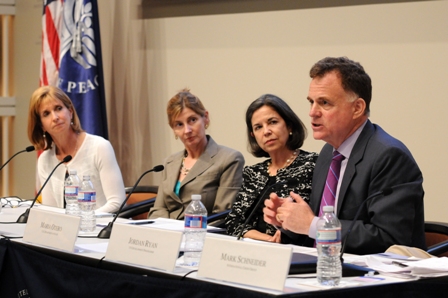Second Annual Conference: Preventing Violent Conflict
For this second annual conference on conflict prevention, USIP brought together experts and policymakers to discuss challenges and opportunities for conflict prevention around the world. The goals of this conference were to spotlight the importance of prevention, discuss specific challenges facing prevention efforts, and identify priority areas for USIP's future work on conflict prevention.
Read the event coverage, Peace: Trending Positive
USIP's second annual conference on Preventing Violent Conflict brought together experts and policymakers to discuss challenges and opportunities for conflict prevention around the world. Almost.jpg) 200 leading policymakers, scholars, diplomats, and nongovernmental organization leaders participated in this all-day conference.
200 leading policymakers, scholars, diplomats, and nongovernmental organization leaders participated in this all-day conference.
The keynote address was delivered by Gareth Evans, chancellor of the Australian National University and former Australian minister of foreign affairs. The first panel highlighted the potential conflicts at risk of breaking out in various regions. This year's conference also included four concurrent break-out sessions allowing participants to discuss specific challenges facing conflict prevention efforts. The afternoon panel reflected on global conflict prevention initiatives by the U.S. government, the United Nations, and civil society.
 One of the goals of this event was to identify priority areas for USIP's future work on conflict prevention. Recommendations for USIP included the development of a guidebook allowing practitioners to apply prevention tools, and research quantifying the costs and benefits of conflict prevention. The U.S. government should channel resources for prevention at an early stage of conflict, and systematically include a gender perspective when analyzing conflict and engaging in conflict resolution efforts.
One of the goals of this event was to identify priority areas for USIP's future work on conflict prevention. Recommendations for USIP included the development of a guidebook allowing practitioners to apply prevention tools, and research quantifying the costs and benefits of conflict prevention. The U.S. government should channel resources for prevention at an early stage of conflict, and systematically include a gender perspective when analyzing conflict and engaging in conflict resolution efforts.
 We look forward to welcoming everybody at USIP's third annual conference in June next year.
We look forward to welcoming everybody at USIP's third annual conference in June next year.
See the keynote address by Prof. Gareth Evans, as well as the remarks from Under Secretary of State for Democracy and Global Affairs, Maria Otero.
Agenda
09:00am | Welcome and Introduction
- Richard Solomon
President, USIP - Dr. Abiodun Williams
Vice President, Center for Conflict Management, USIP
09:15am | Keynote Address
- The Hon. Gareth Evans, Chancellor, Australian National University
10:00am | Panel 1: Regional Challenges
- Dr. Pauline Baker, Chair
President Emerita, The Fund for Peace - Amb. Jendayi Frazer
Distinguished Public Service Professor, Carnegie Mellon University - Amb. Daniel Kurtzer
Lecturer, Princeton University - Dr. John Park
Senior Research Associate, USIP - Amb. Thomas Pickering
Vice Chairman, Hills & Company
11:45pm | Lunch Break (lunch will be provided to participants)
12:45pm | Break-Out Sessions
- The Prevention of Electoral Violence: Facilitator: Dorina Bekoe, U.S. Institute of Peace
- Women and Conflict: Facilitator: Kathleen Kuehnast, U.S. Institute of Peace
- Making the Case for Prevention: Facilitator: Mary Stata, Friends Committee on National Legislation
- The Conflict Prevention Toolbox: Facilitator: Lawrence Woocher, U.S. Institute of Peace
2:15pm | Break
2:30pm | Presentation of Take-Aways by Facilitators of Break-Out Sessions
3:00pm | Panel 2: Global Conflict Prevention Initiatives
- Dr. Paula Dobriansky, Chair
Senior Fellow, Harvard University, and Distinguished National Security Chair, U.S. Naval Academy - Ms. Nancy Lindborg
Assistant Administrator, USAID - Ms. Maria Otero
Under Secretary, U.S. Department of State - Mr. Jordan Ryan
Assistant Administrator and Director, UNDP - Mr. Mark Schneider
Senior Vice President, International Crisis Group
4:45-5:15pm | Conclusion
- Dr. Abiodun Williams,
Vice President, Center for Conflict Management, USIP



